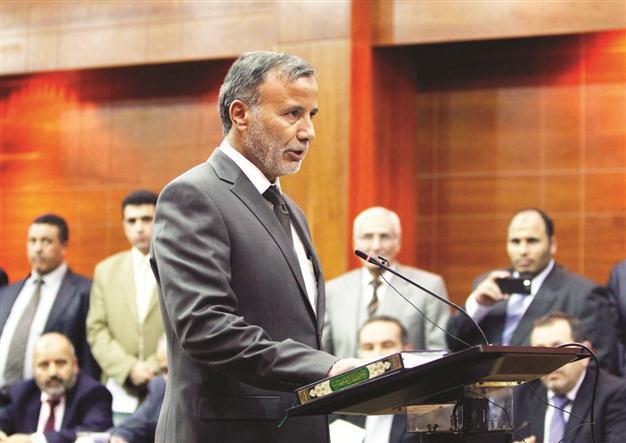‘New military top priority in Libya’
TRIPOLI / TUNIS

Libyan Defense Minister Osama al-Juwali takes the oath of office to join the new government in Tripoli Dec 4. REUTERS photo
Libya’s new defense minister said Dec 4 one of biggest obstacles in forging a new national military is unifying the disparate revolutionary militias that helped topple Moammar Gadhafi’s regime.
More than six weeks since Libya’s civil war ended, the country’s new leaders are still struggling to stamp their authority on the nation and rein in the dozens of armed factions that arose during the war and now are reluctant to disband or submit to central authority. “We have to reorganize,” said Osama al-Juwali. “Most of the rebels are armed and most of them are young. They can be a bit careless and sometimes accidents happen, this is one of the primary obstacles.” He did not say how he plans to bring the fighters under the umbrella of a national army, but said he is in no rush to disarm fighters still in the capital.
Tripoli residents have also become increasingly frustrated with fighters from other areas of Libya who have taken over prime locations in the city. Al-Juwali, who was a commander of revolutionary forces from the western mountain town of Zintan and played a role in the capture Gadhafi’s son, Seif al-Islam, was sworn in Sunday before the country’s new leaders and other Cabinet ministers. Seven other ministers were also sworn in to complete the 24-member Cabinet.
The head of Libya’s National Transitional Council, Mustafa Abdul-Jalil, outlined the priorities of the new government, including looking after the families of those killed in the war, treating the injured, reintegrating the fighters with society. Meanwhile, Libya said Dec. 4 it would secure the area near its border with Tunisia after Tunis closed all of its crossing points, blocking Tripoli’s main supply route, after clashes between militiamen and border guards.
Tunisian officials have said the closure of the second of the two crossings on Dec. 3 was necessary after armed Libyans had exchanged fire with border guards and had also attempted to enter Tunisia undetected. “The ministers of the interior and defense are putting in place a plan in order to secure these two border crossings and also to ensure that this will not happen again,” Deputy Prime Minister Mustafa Abu Shagur told a news conference.
